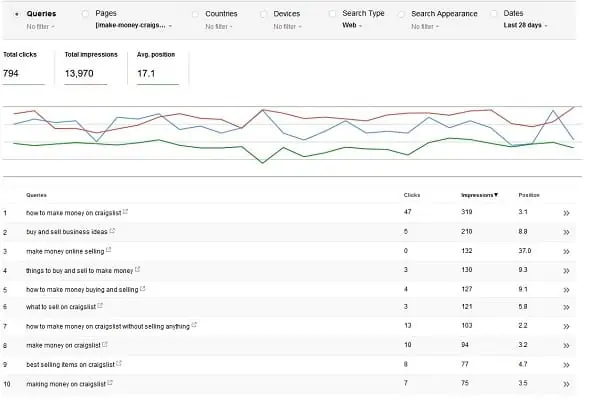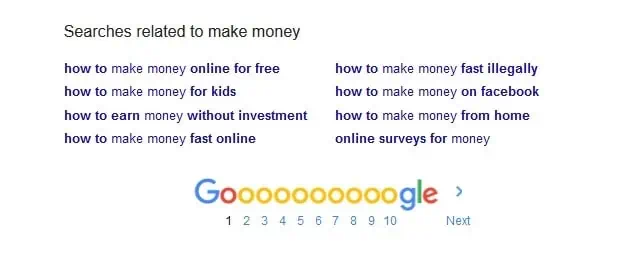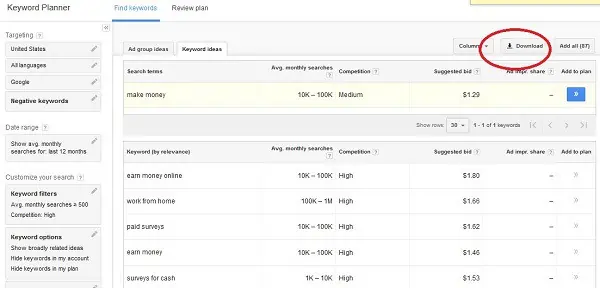Just 15 minutes spent on this keyword research process will boost your Google ranking and avoid wasting your time blogging
What if you could boost your blog traffic by hundreds of visitors for every post you wrote?
Would it be worth an extra 15 minutes per article?
Writing six posts a month, that means an extra 20,000+ visitors in your first year of blogging.
Keyword research can be a pain and most bloggers avoid it altogether. It’s one of the biggest mistakes in blogging and even those checking the basic boxes for keyword ranking may not realize just how important it is.
In fact, you could be wasting your time if you’re not using a simple process of finding the keywords that will bring targeted traffic to your blog.
Case in point, I got lazy with keyword research on one post that I was sure was going to make me loads of money. I used my entire SEO strategy on the post from basic on-page SEO to boosting links with pdf and audio and I even wrote eight guest post for SEO ranking.
This should have led to a surge in the Google ranking for the post and held the potential to make some great money on affiliate offers.
The result. Next to nothing. I make a little on the post but not nearly as much as I should have because I missed two very important problems that keyword research fixes – competition and buyer intent.
Those are two issues most bloggers neglect in basic keyword ranking but we’re going to work through them in this post.

Don’t miss the rest of the book and your chance to dominate Google! Just $3.99 on Kindle could change your life!
We’ll start off with some of the basics before we get into my complete keyword research process that will not only help you get that #1 rank on Google search but will attract the right kind of readers that will make you money!
What is Keyword Research?
The way your blog shows up in Google search is by ranking for keywords which can be one word or a string of several words. For example, ‘money’ is a keyword while so is ‘make money blogging from home’.
The entire idea of search engine optimization is to make it so you rank more highly for keywords than other pages on the internet.
Keyword research is the process of finding the keywords that you want to rank for on Google, which ones will bring you the most visitors and which ones will make you the most money.
It’s a simple idea that can mean the difference between building a profitable blog and just wasting your time even on the most well-written posts.
Why is Keyword Research so Important for Bloggers?
Google search traffic accounts for between half and 80% of total visitors for most blogs so if you are not ranking for keywords then you are only scratching the surface of what’s possible with your blog.
You might be saying, “I get traffic from Google and don’t do keyword research.” Just about any blog will get some traffic just by having a lot of articles but it’s nothing compared to what you could be getting.
Look at the Google Webmaster Search Analytics for my post on making money on Craigslist. The post gets nearly 800 clicks a month from almost 1,000 Google search terms. Some of the keyword phrases rank really well, many on the first page, but none of them are ranking in that top spot.
Since the top two spots in Google search results get up to half the clicks, I’m missing out on a lot of traffic by not ranking the post higher.
Even the bloggers that actually take the time to do keyword research for a post will often stop at simply finding popular keywords with a high volume of monthly searches. The problem is that good keyword research means finding the terms with good volume AND that you can rank for on Google.
Try writing a post for just any high-volume keyword and all you’ll hear are the crickets chirping.
Look at this screenshot of the Google results for ‘Make Money’.

Now this keyword gets nearly 100,000 searches a month, why wouldn’t you want to optimize an article around the term?
Because you’ll be lucky to make it to page five on the search engines.
First, you’ve got to contend with Google Ads at the top of the page. Businesses target these top keywords and take a big portion of the clicks when someone searches for anything that can make them money.
But look at the websites that are in the first four spots in the search. Do you think your blog is going to outrank Forbes and Entrepreneur? I cut off the page but the bad news extends all the way down through the 1st page of Google with mega-websites like LifeHack and The Penny Hoarder.
You’ll notice that my search results with the little black bar may look a little different than what you see. I installed a free keyword research tool called MozBar that will make a huge difference in your keyword SEO and something we’ll hit on later in this post.
So understanding the competition for getting your post on the first page of Google for a keyword is critical but it’s not the only reason why keyword research is so important.
Remember that post that I spent so much time on but didn’t make any money? It wasn’t because it wasn’t getting any traffic. I built the article up to over 5,000 page views a month and was getting over 1,000 clicks through to the affiliates on the page…but few of them were buying!
It’s called the buying process and the visitors I was getting just weren’t ready to buy anything yet.
Let’s first look at understanding which visitors you want to attract to your blog, the ones that will make you money, and then we’ll continue with my complete keyword research process.
Buyer Intent and Keyword Research: Getting the Clicks that Matter
All purchases go through a buying process before a decision is made.
- The person becomes aware of a problem or about a product
- Information helps answer questions the buyer has about the problem and products, building interest in potential solutions
- The person finishes their search for information to make a decision
- A purchase is made
This process may take days, weeks or months for big purchases or it can be almost instantaneous for little purchases like getting a Coke from the vending machine…but it happens in every single purchase.
The level in the process in which someone finds themselves is their buyer intent, how close they are to making a decision.
The biggest problem in keyword research, even for bloggers that spend a lot of time finding keywords with high-volume traffic and for which they can rank, is that few bloggers spend any time thinking about buyer intent.
Think about it. Which would you rather attract to your blog, a thousand visitors just looking for information on a product or 100 visitors that want to buy right now and just want to find the best product for their needs?
The way you manage these visitors, attracting the right ones to make more sales, is by ranking for keywords that show buyer intent.
It’s not to say that articles around building awareness for a solution or product are worthless. You should have articles like these on your blog to give readers a complete view of the topic from start to finish. These types of articles can be a great way to get people into your email list, building that relationship and trust for when they are ready to make a purchase.
Keywords typical to the awareness and interest stage of buyer intent are also usually less competitive than others as well.
Some examples of Awareness and Interest keywords:
- Any search around getting general information
- Symptoms
- How do I
- How [product] is made
- Free [product]
- Types of [product]
Your best traffic though, the visitors that really make you money, is going to be to posts optimized for a keyword that signals high buyer intent. These are keywords that people in the decision and action stage use when they search. They already know what type of product they need and may even know the brands they want to buy.
The downside to focusing on keywords that signal high buyer intent is that they are generally more competitive…duh. Bloggers and companies are going to be going after these keywords because they bring traffic that makes more money.
That doesn’t mean you can’t rank for these terms though, it just means you need to think about buyer intent when you’re using the keyword research process below.
What is Long-tail Keyword Research?
Just one last concept before getting to the keyword research process that will get you the Google love to be successful.
Everyone wants to rank on the first page of Google for the term ‘make money’ but we already saw that it’s not going to happen unless you run a mega-site like Forbes or the Huffington Post. The keyword gets tens of thousands of monthly visitors and even a percentage of it could mean big time blog traffic.
But it’s just a pipe dream for 99% of bloggers.
The answer is what’s called long-tail keywords. These are phrases three- and four-words long that are far less competitive and will ultimately mean more traffic because you’ll actually rank on the first page.
Look at these five Google searches:
- Make money online
- Make money blogging
- Make money online with real estate
- How do I make money fast?
- What is the best way to make money?
All five include the keyword ‘make money’ and contribute to the super-high search volume it gets every month. Two of the five include the term ‘make money online’ which is another high-volume keyword but not as high as the shorter term.
The longer searches like ‘make money online with real estate’ is going to have much fewer bloggers going after it because there will be fewer people searching the term every month. That means you’ll have less competition to rank the keyword.
Did you notice another important idea in the list of five keyword searches?
There’s a huge range in what the search is trying to find. Why would you spend so much time optimizing a post and going through so much SEO work to rank for the term ‘make money’. Unless you covered virtually every way to make money in the post, a lot of your visitors are going to be disappointed.
Looking for good long-tail keyword ideas in your research will not only help you find terms for which you can rank on the first page of Google but will also help give your readers a better experience.
How to Start the Keyword Research Process for a Blog Post
I hope you’re still with me because now we get to the actual keyword research process and the free keyword tools I use to rank every post.

Here’s the keyword research process in a nutshell:
- Brainstorm keywords on the post topic and the article goals
- Use Google drop-down and related search suggestions
- Use Google Adwords suggested keywords and ‘Get Ideas’ from KWP
- Look for linked words on the topic Wikipedia page
- Look for sub-Reddits and group questions
- Narrow your list by monthly search impressions
- Narrow your list by buyer intent
- Use the MozBar extension to find less competitive keywords
Start out the keyword process by brainstorming a few higher-level keyword ideas. What is the broad topic covered in the post and what questions does it answer? What do you want readers to learn or do after reading the post?
If you were searching for the topic, how would you search in Google? Brainstorm a list.
I will often write up a post or at least develop a detailed outline before doing keyword research. Then I go back and see what words or phrases show up the most. This helps me find keyword ideas that occur naturally in the content.
After doing your full keyword research process, you can go back through and do a quick rewrite or just place your exact keyword into sections of the post. You’ll also be able to place synonyms and related keywords within the post, both very important as signals to Google on the keyword ranking.
Too many bloggers have a keyword they want to target before writing a post and then just try to stuff it in the writing. It leads to a clunky reader experience and Google penalizes the page because the keyword isn’t natural.
Best Free Keyword Research Tools
After putting together a quick list of ideas, I’ll run to several free keyword research tools on the web. There are also paid tools available, many that do other tasks like competitor research and link-building, but you’ll get everything you need with the keyword tools below.
- Google search drop-down is simply typing in your keyword ideas and seeing what Google suggests as you type. These are going to be very popular searches with high traffic but may also be very competitive.
- Google related search suggestions are displayed at the bottom of the search page and can be a great keyword resource for longer-tail ideas
- Google Adwords suggest reveals a lot of keyword ideas. Go to the Keyword Planner Tool and then Campaigns. Start a new campaign and copy the URL to a competitor’s article where it says ‘Enter your Landing Page’. You’ll need to enter a starting bid and daily budget but you won’t be actually starting this campaign so don’t worry about spending any money.
Google will scan the landing page you entered and suggest keywords related to the page.
- Another resource is the Google Keyword Planner tool itself. Log in to your Adwords account and go to the keyword planner. Click on the ‘Search for new keywords using a phrase, website or category. It’s not a requirement but I like to change the filters for monthly searches above 500 and high competition. Make sure you target for your location and language.
The result will be a huge list, usually into the hundreds of keyword ideas with monthly search volume. I like to download the list into Excel which makes it easier to add my other keyword ideas.
- One free keyword research tool that few people use is Wikipedia. Go to the Wiki page for your broad topic and look through it for linked words, those highlighted in blue and clickable. This is going to give you a list of related words and the Contents box is a great resource for sub-level keywords.
- Reddit can also be used to find keyword ideas. Search for your post topic to find sub-reddits and look through the forum titles to see common questions and keywords that people use frequently.
- Finally, UberSuggest is another free keyword tool that generates hundreds of keyword ideas. You won’t need to copy down all the suggestions but browse through the list to pick out any ideas that sound relevant.
These seven free keyword tools will give you hundreds of ideas and it takes less than 10 minutes to run through them all. You may not need to use every resource for every blog post but make sure you build a good list of potential keywords.
Narrowing the Keyword List for your Blog Post
With this initial list of keyword ideas, head over to the Google Keyword Planner again and paste them into the ‘Get search volume data and trends’ box. This will give you the monthly searches, competition and suggested bid for each keyword.
I usually will delete any keyword ideas with less than 1,000 monthly searches but you may want to keep a few lower volume ideas if there aren’t much higher-volume options.
You will also want to sort the list by the competition score (1.0 is high) and by suggested bid. Something most bloggers get wrong is that the competition score is not the difficulty in ranking the keyword, it’s the relative number of people bidding on the term in Adwords.
This and high suggested bid keywords are important because they signal a high level of buyer intent…why else would a lot of Adwords bidders be willing to pay a high price for the keyword? You also want to browse through the list for any action words or keywords that sound like a person would be close to making a buying decision.
After this, you should have a list of at least 10 to 20 potential keywords. Next you are going to see how easy it will be to rank each of these keywords and select one for your post.
Open up Google Chrome for your internet browser. Yeah, I like FireFox better as well but Chrome has some great extensions that are must-haves for bloggers. You can still use another browser for ‘net surfing but you want to use Chrome for your keyword research.
Install the MozBar extension by searching for it on Google and clicking install. This is going to give you all kinds of great SEO clues when you do a search. Type in each of your short-list keyword ideas individually to see ranking details.
There are three things you will look at to determine keyword difficulty and whether you have a chance of ranking for a keyword.
- Page Authority (PA) is the most important. Google ranks pages, not domains though a site’s overall domain authority will affect the PA.
- Domain Authority (DA) is still important because higher authority domains will find it easier to boost their PA.
- Links are a big factor in page authority besides all the on-page factors we covered previously. Even if a page has a lower PA, it can still rank for a keyword if it has a lot of quality links to it. Check out this post on how to boost your blog with quality link building.
You can find your own website’s domain authority by clicking over to the Moz Open Site Explorer (Moz OSE) or using any number of free tools on the web. The page authority for a post will differ depending on the number of inbound links and other factors.
I like to average the PA for the top five pages on Google. You are looking for which keywords in your list will be most easily ranked.
- Average PA of under 35 will be easy to rank
- Average PA between 35 and 50 can rank with a full SEO Process
- Average PA between 50 and 60 will be harder to rank and you’ll need serious SEO
- Average PA above 60 and you better be Forbes if you want to rank
Once you’ve found one keyword idea that has good search volume, high buyer intent and is not too competitive to rank…you’re ready to put it into your post. Refer to this article on writing blog posts for SEO and on-page factors for how to let Google know that the keyword is important.
Don’t trash your list of potential keywords for the post. You will want to use some of these in place of your main keyword so it doesn’t look like you’re stuffing one keyword into your post. You will also want to use a few of these as your anchor text in guest posts to link back to the article.
If Google sees one anchor text linking back to a post, it may assume you are trying to manipulate the rankings. Use some related variations though and you’ll have a better chance of ranking many different keywords.
What the Keyword Research Process Means for Your Blog
If you aren’t ranking on the first page of Google then you aren’t getting the traffic you need to be really successful. You might get some Google traffic here and there but it’s a trickle of what you could be getting.
You don’t want a traffic trickle…you want a traffic firehose for every single post!
It’s why we focus most of our competitive research on the first page. Even the tenth result in a Google search typically only gets 2% of the clicks so you can imagine what ranking on the second or third page means.
In fact, I would rather rank first on Google for a keyword that only gets 500 monthly searches than ranking #10 for a keyword that gets ten-times as many searches!
As an example, I used data on the percentage of clicks each spot on Google typically gets to show how much traffic you can expect for keywords with different search volume.
The top spot for a keyword with just 500 monthly searches can send you 163 visitors a month, more than the #10 ranked page for a keyword that gets 5,000 monthly searches. Understand too that those high-volume keywords that are getting 5k, 10k and 50,000 searches are extremely competitive and you probably won’t even be able to get on the first page.
This strategic use of keywords will make all the difference for your blog. Using a keyword research process that includes buyer intent, competition and search volume will not only help you rank on Google but will make sure you’re getting the kind of traffic that makes you money. Take the extra 15 minutes to run through this keyword process for every post and you’ll be out ahead nearly every other blogger.








